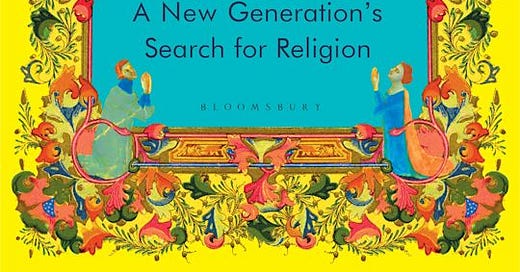Lamorna Ash is a good writer, a better listener, and a blueprint of self-awareness.
Her book (which
put me on to — thank you Henry), is about Christianity in Britain, especially among Gen Z-ers. Ash began researching Christianity when two of her university friends, a comedy double act, became Christians; after she spoke to them, she decided to speak to others.As the book pushes on, Ash feels increasingly enchanted by Christianity — albeit one of a more progressive flavour. It tentatively ends with conversion: “I know you don’t need religion to keep awake, or to be a good person — often he opposite is true. But I think I might need it for that. I think I might need the ritual of Sunday worship to discover the courage to become the version of myself I would like to be.”
I am happy for her, and also slightly envious.
The book is stylish and subtle. I think all medium length book reviews should contain a representative extract, so readers know whether the prose is for them. Here is one vignette, pulled pretty much at random:
Damian was not brought up a Christian, but his Gypsy traveller heritage — he is a native speaker of the Romanian language — came with numerous superstitions, space for interventions from ghosts and devils. ‘And I’m not denigrating it,’ he said, but his family would worry over things like taking the Lord’s name in vain. He thinks it’s a fallacy to suggest our contemporary way of being is all that different from a first-century Judeo-Christian worldview, that we have progressed beyond the need to imagine existences beyond our own.
A his secondary boarding school in Sussex, he moulded himself into the anti-religious intellect of their year, a copy of Camus or Sartre sicking out of his back pocket. During his early days there he was very homesick. As an adolescent, he experienced ‘a general sense of feeling ill at ease being me’, he said, all the usual guilt and shame around juvenile romantic encounters and the like. Sometimes he would try to pray. He didn’t believe in what he was doing and it brought him comfort: he wasn’t sure how to reintegrate these two truths. In his spare time, he liked to stay up arguing with his Evangelical friends from the Christian Union (especially at universities, skew towards conservative Evangelical doctrinal positions). They were regarded as uncool, so most kids persecuted them on aesthetic grounds. Damian was more interested in nailing them on intellectual grounds — ‘What I thought were intellectual grounds,’ he qualified.
To spoil the ending, Damian has a religious experience. Walking through an avenue of trees, “Damian realised, in a single instant, that the whole world was animate. That ever part of the universe was alive. More: every particle of the universe was smiling at him.”
Rather than taking this a cue to convert to animism or Advaita Vedanta Hinduism or the panpsychism of
or , Damian joins the Christian Union, church-hops for a while, comes to accept a peculiar form of something-ism, and finds a measure of intellectual peace in the writing of .The converts and deconstructers Ash befriends don’t follow any particular pattern: there are traditionalist conservatives, liberal Quakers, transgender Christians, and a self-declared conspiracy theorist called Max who breaks down into prayer listening to Kanye’s “Jesus is King” on a Yacht. Ash is masterful at eschewing condescension: even when she speaks to Christians far, far, far to her right, Ash’s writing is free of superiority or condemnation or sneering; she notes her feelings of politicised anger in the heat of this or that exchange, but her anger has evidently dissipated by the time she puts pen to paper, by which point all that is left is uncertainty.
Still, I see why, at points, conservative Christians like
might feel a certain degree of frustration about the book. Ash baldly expresses her view that homosexuality is “a sin which never should have been described as such, because it has never been the missing of a mark.” But readers are left in the dark as to whether Ash thinks the New Testament is in error on this question, or whether the New Testament is not in error but has been mistranslated or misinterpreted or something.(For the record — given the intellectual dustiness of existing attempts by Christian ethicists to supply a reason why homosexual acts are wrong and/or why God would have a good reason to forbid them across the board — I think it can be perfectly reasonable for Christians to take the attitude that homosexuality is obviously fine, without taking a settled view about whether Paul made a moral mistake. But, however one thinks about this issue, I think it would help for progressive Christians to be as upfront and candid about their thinking as conservative Christians typically are.)
Don’t Forget We’re Here Forever is a good read and a fairly quick one — the book is medium length (approx. 300 pages), but the prose functions as an airport travelator, so the reading time is artificially fast-tracked.
For more, listen to
interview Ash on his Substack, , which he was clearly extremely prepared for.




Nice review! Glad you liked the book. I think that's probably right about homosexuality and the NT, but she does, iirc, make the point that Jesus never comments on sexuality, which I take to the basis of her position that it is therefore not a sin, and she doesn't really need to go into Paul for that.
I find that people from all manner of religions report the same experience described by Damien, a sort of "(re)enchantment of the world", where meaning/miracles/magic become a constituent part of reality.
Which religion they deduce from it falls on priors: for someone who grew up or lived a decent chunk of life with an Anglican church on every corner, Christianity would be their "default setting" unless they were curious and interested enough to study other faiths.